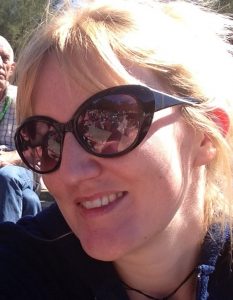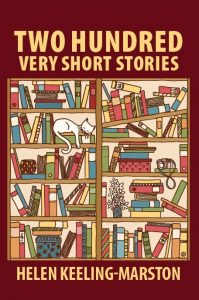Ever hear someone complain that they don’t have time to read? That books take too long to get through, that the time commitment to actually finish the story is the reason they don’t read? Well, you’re not the only one to hear those complaints – and author Helen Keeling-Marston has a solution: micro-stories. I recently learned a bit more about her new book – 200 Very Short Stories.
Your collection focuses on short (and exceedingly short) stories, and is intended to draw in the “I’m too busy to read” audience. Do you think that shorter story forms are becoming more popular as a result of the increased pace of the modern world?
Yes, I think so. One of the reasons why I wanted to write this book was because I often get into bed on a weekday evening, pick up the latest book that I’m reading – but then quickly fall asleep as I’m so tired from the craziness of the day. I find that such short reading spells mean that I often really lose the thread of a novel, so I wanted to come up with something where you only need to be attentive for a few minutes, but you still get a start, a middle and an end. That said, there’s simply no replacement for a full-length novel – but, personally, I find that I get the most enjoyment from full-length novels during my weekends or when I’m on relaxing holidays.
Do you think that also explains increases in more passive reading experiences, like audio books, and the trend toward book trailers and book information in video form via vehicles like YouTube?
I think that, in today’s society, where lots of people have a lot of responsibilities and interests that they need to / want to cram in, then multi-tasking in key! Therefore, audio books can be “consumed” whilst doing other activities such as jogging or ironing. Thus people can cram more into their days.

Your decision to incorporate active reading – like the mirror story – in this book is an interesting one. On one hand, immersive reading would seem to help readers stay fully engaged and “in” the story; on the other, it would seem to require more of a commitment (of attention, if not of time). Given your recognition of time constraints facing modern audiences, why did you decide to incorporate interactive tales in this collection?
A good point. Within my collection of two hundred very short stories, only a tiny proportion are immersive stories, but my hope is that these few stories are sufficiently intriguing and perplexing that they will make the reader really want to “crack” them.
Do you think that, with the increased emphasis on multimedia experiences and the growth in e-reading, we will see an increase in “active reading” formats?
It’s very likely. Imagine how, say, virtual or augmented reality could be used to involve a “reader” in a story. It’s really exciting to be alive during the digital revolution and to witness how entertainment is changing; you never know what’s coming next! I think it’s unlikely that the appeal for actual physical books will ever disappear, though, and you could argue that a physical book requires a human to use their imagination a lot more than potential future, more immersive forms of “reading” will, as, with physical books, you need to use your imagination to decide how characters look and sound etc., and that’s part of the fun!
While you necessarily sacrifice some depth in individual short stories, it would seem that you might simultaneously open up opportunities for increased breadth across an entire collection. Do your stories focus on a theme or concept?
Without giving too much away, the book is loosely themed around the concept of “luck”. I won’t say too much more though!
Do you find that shorter story formats open up more opportunities for varying your voice and perspective? Does that change how you write them or prepare a collection?
I think that writing lots of very short stories is extremely fun because you get to step into the shoes of a range of different types of people and personalities, who have widely varying thoughts and perspectives. To do this, though, I think that you need to do quite a lot of research into how people who are different to you “tick”. The best way to do this is to try to put yourself in lots of different situations and environments, and really observe people.


 Jill-Elizabeth LinkedIn
Jill-Elizabeth LinkedIn




Leave a Reply